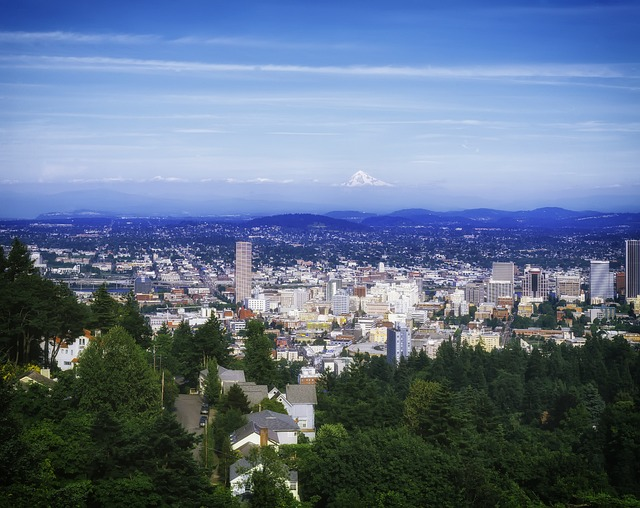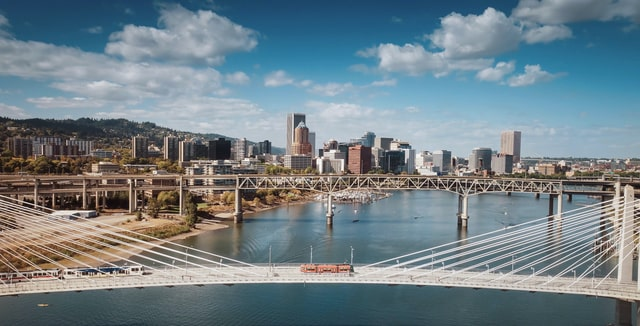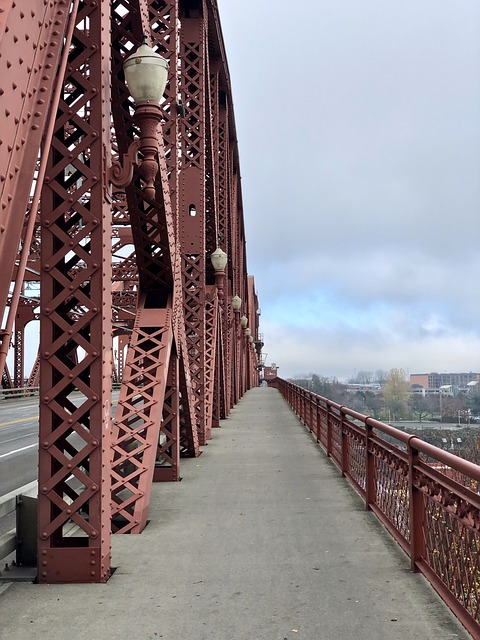
Known as the “City of Roses” and for its catchphrase, “Keep Portland weird,” Portland, Oregon is a unique area in the Pacific Northwest bursting with good music, spectacular food (including wine, beer, and coffee), and no shortage of outdoor opportunities. It’s no wonder it’s captured the minds and hearts of so many, including the creators of the absurdist parody series “Portlandia–“ but Portland is actually a smart investment for real estate owners looking to expand their portfolio as well. Let’s explore the best places to invest in Portland, Oregon, including rental property opportunities.
New to passive real estate investing?
Explore Ark7 OpportunitiesIs Portland, Oregon Worth Investing In?
Portland, Oregon, often known for its vibrant culture, stunning natural landscapes, and thriving economy, has been a hotspot for real estate investment in recent years. To determine whether investing in this dynamic city is a wise choice, it’s essential to evaluate several critical factors, including the rental market, home values, and the average monthly mortgage payment.
Overview of the Rental Market:
The first aspect to consider is the rental market. Portland has experienced a surge in demand for rental properties due to a growing population and an influx of job opportunities. Neighborhoods like the Pearl District, Alberta Arts District, and Hawthorne are particularly attractive to renters. Rental rates have been on an upward trajectory, offering promising income potential for property investors.
It’s worth noting that Portland’s rental property management services are well-developed, which can make owning rental properties a more convenient venture. Efficient property management ensures that your investment is well-maintained and attractive to tenants, leading to consistent rental income.
Increasing Oregon Home Values:
Oregon, including Portland, has witnessed a consistent increase in home values over the years. This appreciation can be attributed to factors like a robust local economy, limited housing inventory, and a desirable lifestyle. Historical data reflects a steady climb in property values, and future projections are equally promising. In fact, the average home value in Portland as of 2023 is roughly $532,000, according to Zillow.
Government initiatives and policies also play a role in the real estate market’s health. Staying informed about developments like tax incentives and zoning changes can provide valuable insights for potential investors.
Average Monthly Mortgage Payment:
Understanding the average monthly mortgage payment is crucial for investors looking to finance their purchases. Portland’s mortgage rate environment can vary, so it’s essential to monitor the current rates to make an informed decision–though on average, as of May 2023, it was around $2,500 (via Sammamish Mortgage). Consider using a mortgage calculator to estimate your monthly payments accurately, taking into account factors such as property taxes and insurance.
By having a clear picture of your financial obligations, you can assess whether the investment aligns with your budget and long-term financial goals.
Median Home Value, Median Rent, and Home Prices:
Comparing the median home value, median rent, and home prices is essential for gauging the overall real estate landscape. The median home value in Portland can give you an idea of the market’s stability and growth potential. It’s essential to compare this figure to national averages and historical data to identify trends.
Similarly, understanding the median rent in the city and how it compares to neighboring areas can help you determine the competitiveness of your rental property. Assessing trends in home prices, including which neighborhoods are experiencing significant increases, can provide valuable insights for strategic investments.
Overview of the Rental Market
The rental market in Portland, Oregon, has been a focal point for both investors and renters alike. Portland’s status as a bustling urban center has driven a steady demand for rental properties. Several factors contribute to this robust demand. Firstly, Portland’s population has been steadily increasing, driven by a combination of natural growth and an influx of newcomers seeking opportunities in technology, healthcare, and the creative industries. This population growth has generated a constant need for housing, and rental properties are often the go-to choice for many newcomers before considering homeownership.
Additionally, Portland’s strong job market, with companies such as Nike, Intel, and various tech startups, has further boosted the rental market. Job seekers flock to the city, especially young professionals drawn by the city’s cultural vibrancy and job prospects. Neighborhoods like the Pearl District and the West End have become prime destinations for renters, offering easy access to downtown and a wide array of amenities.
The supply of rental properties, though growing, hasn’t kept pace with the demand, contributing to rising rental rates. This trend has made Portland an attractive market for real estate investors looking for steady rental income. It’s important for potential investors to carefully assess neighborhoods and property types within Portland to find the most promising rental opportunities.
Increasing Oregon Home Values:
Oregon’s real estate market, including Portland, has seen substantial increases in home values over the past decade. This appreciation can be attributed to several factors. Firstly, Portland’s diversified economy has remained strong, with consistent job growth and a low unemployment rate. This economic stability attracts both new residents and investors to the area, further driving up housing demand.
Limited housing inventory has also played a significant role in pushing up home values. The city has faced challenges in keeping up with the demand for housing, particularly in desirable neighborhoods. This supply-demand imbalance has led to bidding wars and higher property prices.
Moreover, Portland’s reputation for its quality of life, outdoor activities, and vibrant arts scene has drawn in people from across the country. Many are willing to pay a premium to live in this culturally rich city, which has further propelled home values upward. This trend has been evident not only in the city but also in surrounding suburbs and neighboring towns.
Average Monthly Mortgage Payment:
When contemplating real estate investment in Portland, one must consider the average monthly mortgage payment. Mortgage rates in Portland can fluctuate based on market conditions and economic factors. Therefore, potential investors should keep a close eye on these rates. Factors such as credit score, down payment amount, and the type of mortgage loan can also impact monthly payments.
Calculating the average monthly mortgage payment is vital for assessing the feasibility and sustainability of real estate investments. Prospective investors should factor in other costs, such as property taxes, homeowners’ association fees (if applicable), and insurance premiums. It’s crucial to create a comprehensive financial plan that accounts for all these expenses to ensure a comfortable and profitable investment experience.
Median Home Value, Median Rent, and Home Prices:
To gain a more holistic understanding of the Portland real estate market, it’s essential to delve into specific data points like median home values, median rent, and home prices.
The median home value in Portland serves as a key indicator of market health and stability. Investors should consider how it aligns with their investment strategy, whether they’re looking for properties in neighborhoods with steady appreciation or those with the potential for rapid growth.
Understanding the median rent in Portland provides insights into the rental income potential. At an average of $1,800 (from RentCafe), costs of maintenance should be weighed with rental income and Return on Investment. Analyzing this figure relative to property purchase prices can help investors identify opportunities with favorable rental yields.
Finally, examining home prices across different neighborhoods is essential. Portland’s neighborhoods can vary significantly in terms of home prices, even within the same general area. Identifying neighborhoods where home prices are attractive for investment purposes can be a strategic move for investors looking to maximize their returns

How to Pick a Neighborhood For Rental Property In Portland
When selecting an investment property neighborhood in Portland, Oregon, it’s crucial to consider a variety of factors that can impact the property’s long-term value and rental potential. Begin by assessing the neighborhood’s location and proximity to amenities. Look for areas with easy access to grocery stores, schools, parks, and shopping centers, as these conveniences can attract tenants and contribute to the property’s overall appeal. Additionally, evaluate the neighborhood’s accessibility to public transport, such as bus lines and light rail systems, which can make commuting more convenient for residents and enhance the property’s desirability.
Job opportunities are another critical factor; neighborhoods near major employment centers or with a thriving local job market tend to have higher rental demand. Furthermore, research the neighborhood’s crime rates, school quality, and potential for future development or gentrification, as these factors can affect property values and rental income. Ultimately, a comprehensive analysis of location, amenities, transportation, job prospects, and neighborhood trends will help you make an informed decision when selecting an investment property in Portland.
The Top 5 Best Neighborhoods for Rental Investment Property in Portland
Portland, Oregon, is a city known for its diverse neighborhoods, each offering unique characteristics and investment potential. For real estate investors seeking the best neighborhoods for rental investment properties, here’s an overview of the top seven areas to consider:
1. Alberta and Other North Portland Neighborhoods:
Alberta Arts District, along with neighboring North Portland areas like Mississippi Avenue and Boise-Eliot, are excellent choices for rental investments. These neighborhoods have experienced significant gentrification and revitalization, attracting a young and vibrant community. With an eclectic mix of shops, restaurants, and cultural events, rental properties in this area can command competitive rental rates and attract tenants looking for a lively urban lifestyle.
2. Pearl District:
The Pearl District is a trendy, upscale neighborhood located in downtown Portland. It offers a blend of historic warehouses converted into lofts, high-rise condominiums, and contemporary apartment buildings. The neighborhood’s proximity to parks, art galleries, and upscale dining establishments makes it an attractive destination for renters seeking a cosmopolitan lifestyle. Rental properties in the Pearl District tend to have high occupancy rates and strong rental income potential.
3. Goose Hollow Neighborhood:
Nestled close to downtown Portland, Goose Hollow is a historic neighborhood known for its charming homes and proximity to cultural venues like the Portland Art Museum and Providence Park, home to the Portland Timbers. Rental properties here can appeal to sports enthusiasts and those who enjoy easy access to downtown amenities. The area’s character and convenient location contribute to strong rental demand.
4. Sellwood Neighborhoods:
Sellwood-Moreland, located in Southeast Portland, is a family-friendly neighborhood with a mix of Victorian-style homes and newer developments. Rental properties in Sellwood can be attractive to families due to its good schools and parks. The neighborhood’s commercial corridor along SE 13th Avenue offers a variety of shops and restaurants, enhancing its appeal to renters seeking a sense of community.
5. Nob Hill Neighborhood:
Also known as the Northwest District or “Trendy-third,” Nob Hill is a charming and upscale neighborhood in Northwest Portland. It features tree-lined streets, boutique shops, and a thriving dining scene. Rental properties in Nob Hill are highly sought after by professionals and urban dwellers who appreciate the area’s walkability and proximity to Forest Park.
Best Neighborhoods for Long-Term Investing in Portland, Oregon

Investing in real estate for the long term in Portland, Oregon, requires careful consideration of factors like economic growth, location, and property type. Here are some of the best neighborhoods for long-term real estate investments in the area:
Hillsborough:
Hillsborough, an affluent neighborhood in the western part of Portland, is an attractive option for long-term real estate investments. The area features well-maintained homes, excellent schools, and a strong sense of community, making it desirable for families. Long-term investors can consider single-family homes or multi-family properties in Hillsborough, as the demand for quality housing in this neighborhood is expected to remain steady.
Mississippi Neighborhood:
The Mississippi Neighborhood, located in North Portland, has been experiencing a resurgence in recent years. This area is known for its vibrant arts scene, unique boutiques, and a diverse culinary landscape. Long-term investors may find value in mixed-use properties, including residential apartments above commercial spaces. As Portland’s urban growth boundary expands, North Portland neighborhoods like Mississippi could see increased demand for both residential and commercial real estate.
Northwest Portland for Industrial Spaces, Southwest Portland for Commercial:
For investors interested in commercial and industrial properties, specific regions of Portland offer promising long-term potential. Northwest Portland is well-suited for industrial spaces due to its proximity to the Port of Portland and transportation infrastructure. Investing in warehouses or manufacturing facilities in this area could yield stable long-term returns, especially with the ongoing growth of e-commerce and logistics.
On the other hand, Southwest Portland is a strategic location for commercial investments. This region is home to thriving business districts and office spaces. Long-term investors can consider properties such as office buildings or retail spaces, benefiting from the city’s continued economic development and population growth.
How to Find Oregon Investment Properties
Portland is many things to many people–and the culture (and associated counterculture) seem keen on keeping the status quo one of openness and exploration. With a vibrant cultural scene, there is never a dull moment in Portland–perhaps why so many are interested in moving to the area, without even factoring in the area’s job opportunities or academic centers.
When it comes to securing your Portland rental property, you don’t necessarily have to go through a real estate agent. In fact, you can cut out the “middle-men” completely through platforms like Ark 7 and invest in share-by-share investing: real estate investing on your budget and your terms.
For more on how to start your share-by-share real estate investing journey, click here.
Here are some other useful resources –
- Investment Properties In Colorado
- Investment Properties In Phoenix
- Investment Properties In Kansas City
- Investment Properties In Tampa
- Investment Properties In Miami
- Investment Properties In Dallas
- Best Neighborhoods To Invest In Baltimore
- Best Neighborhoods To Invest In Philadelphia
- Best Neighborhoods To Invest In Detroit
- Best Places To Invest In Charlotte
- Best Place To Invest In Maryland
